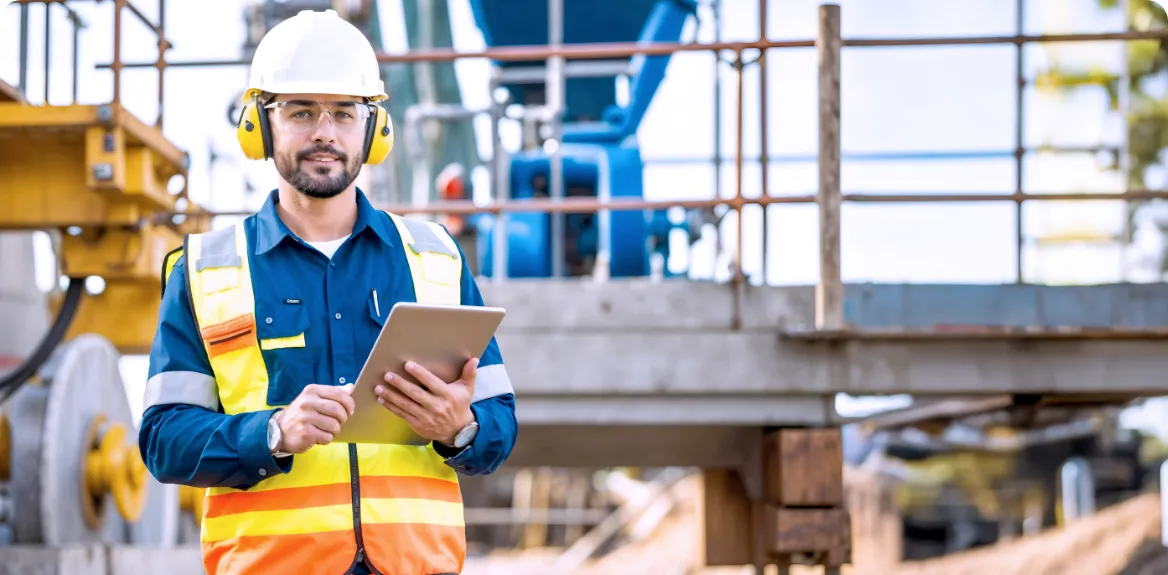
Construction technology is revolutionizing the industry by improving efficiency, safety, and project outcomes. Innovations like AI, robotics, and BIM are transforming processes, offering both benefits and challenges. Embracing these advancements is crucial for staying competitive and driving future success in construction.
As construction technology evolves rapidly, it is reshaping how projects are planned, executed, and managed. Digital transformation plays a crucial role in this evolution, enabling construction professionals to leverage innovative technologies for improved efficiency and effectiveness. Understanding the strategic considerations surrounding technology adoption is vital in this context. This article delves into various aspects of construction technology providing essential insights for navigating the complexities of this fast-evolving field.
Understanding key considerations will empower you to make informed decisions that enhance safety, efficiency, and cost control in your projects.
According to a recent report, "The global construction technology market is set to reach USD 23.5 billion by 2027, growing at a CAGR of 14.4%". This highlights not just a trend, but a fundamental change in how we approach construction.
By grasping strategic considerations, you can maximize your return on investment (ROI) and improve project outcomes.
To fully appreciate the impact of technology on the construction industry, it's essential to define what construction technology encompasses. This broad term includes various tools, methodologies, and innovations designed to enhance efficiency, safety, and productivity on construction sites. Understanding this definition sets the stage for exploring the evolution of these technologies and their significance in the modern construction landscape.
Construction technology is a multifaceted field that incorporates a wide range of tools, software, and techniques aimed at improving construction processes. This includes project management software that streamlines communication, advanced machinery that automates labor-intensive tasks, and emerging technologies such as artificial intelligence (AI) and Building Information Modeling (BIM). By integrating these technologies, construction firms can significantly enhance operational efficiency, reduce delays, and lower costs.
Moreover, the growing emphasis on sustainability has led to the development of green construction technologies, which aim to minimize environmental impact while maximizing resource efficiency.
Historically, construction relied heavily on manual labor and rudimentary tools, which limited efficiency and accuracy. However, the advent of modern construction technology has brought about transformative changes. The introduction of digital tools has streamlined project workflows, allowing for real-time data sharing and improved collaboration among teams. Technologies like 3D printing and modular construction are revolutionizing traditional building methods, enabling faster project completion and reduced waste.
With the ongoing advancement of technologies such as robotics, AI, and the Internet of Things (IoT), the construction industry is poised for further evolution, characterized by smarter, safer, and more efficient operations.
With construction technology adoption growing at a rate of 18% annually across North America, it’s clear that its impact is significant and growing. (source).
As we move forward, let’s explore the future advancements in construction technology that will shape the industry.
As we look to the future, the landscape of construction technology is poised for transformative change. Emerging technologies promise not only to enhance existing processes but also to redefine what’s possible in construction. Let’s explore several key innovations that are set to shape the industry, from automation to sustainability, and how these advancements can lead to more efficient and environmentally friendly construction practices.
The construction industry is rapidly adopting autonomous technology to revolutionize site operations. Self-operating heavy machinery, such as autonomous excavators, bulldozers, and dump trucks, can increase efficiency, reduce labor costs, and improve safety on construction sites. These machines, equipped with advanced sensors, GPS technology, and AI, can navigate complex terrain, perform precise tasks, and work around the clock, minimizing human error and potential accidents. As autonomous technology continues to advance, it is poised to reshape the future of construction, making it more productive, sustainable, and safer.
Robotics is transforming the construction industry, enabling the automation of repetitive and dangerous tasks. Advanced robots, powered by artificial intelligence and machine learning, can perform complex tasks with greater precision and autonomy than human workers. For example, robotic arms can precisely install drywall, lay bricks, and weld steel beams, ensuring accuracy and consistency. Additionally, robots can be used for inspection and maintenance, reducing the need for human intervention in hazardous environments. As robotic technology continues to evolve, it will play a crucial role in addressing labor shortages, improving productivity, and enhancing the overall quality of construction projects.
Biotechnology is emerging as a groundbreaking field with the potential to revolutionize the construction industry. By harnessing the power of biology, innovative techniques are being developed to create sustainable and efficient building materials. For instance, bacteria can be used to produce bio-cement, a sustainable alternative to traditional cement. This eco-friendly material has the potential to reduce carbon emissions and minimize the environmental impact of construction. Furthermore, self-healing concrete, infused with bacteria, can repair cracks and damage, extending the lifespan of structures. As biotechnology continues to advance, it will enable the development of innovative building materials and construction methods, leading to a more sustainable and resilient built environment.
Automation and robotics are at the forefront of the construction technology revolution. These advancements are designed to perform tasks that are traditionally labor-intensive, reducing the likelihood of human error while increasing efficiency. Robots can handle repetitive tasks, such as bricklaying or concrete pouring, allowing human workers to focus on more complex, value-added activities. Additionally, autonomous vehicles are being utilized for transporting materials and site monitoring, significantly improving logistics on job sites. The widespread adoption of automation not only enhances productivity but also has the potential to alleviate labor shortages in the industry.
Artificial Intelligence (AI) and machine learning are becoming integral to construction management, enabling firms to make data-driven decisions. These technologies analyze vast amounts of data from previous projects to identify patterns and predict potential issues. For instance, AI can optimize scheduling, reduce material waste, and forecast budget overruns, allowing for proactive management. Furthermore, machine learning algorithms can continuously improve their accuracy and effectiveness by learning from new data inputs. As a result, AI-driven solutions are enhancing overall project management efficiency and driving innovation in construction practices.
3D printing is revolutionizing the construction landscape by enabling the rapid production of building components. This technology allows for the creation of complex architectural designs with minimal waste, significantly reducing construction timelines. Moreover, 3D-printed structures can be produced with eco-friendly materials, aligning with the industry's growing focus on sustainability. As this technology matures, it holds the potential to lower costs and increase accessibility to affordable housing solutions.
Blockchain technology is set to transform the construction industry by enhancing transparency and accountability in transactions. This decentralized ledger system can securely record contracts, payments, and project documentation, reducing the risk of fraud and disputes. By streamlining processes and ensuring secure data sharing among stakeholders, blockchain has the potential to improve collaboration and trust within project teams. As more companies explore its applications, blockchain may become a cornerstone of modern construction project management.
Virtual and augmented reality technologies are enhancing collaboration and visualization in construction projects. These immersive tools enable stakeholders to visualize projects in a realistic environment before construction begins, facilitating better communication and decision-making. For instance, architects can use VR to present designs to clients, allowing for real-time feedback and modifications. AR can assist workers on-site by overlaying digital information onto physical structures, improving accuracy and reducing errors. The integration of these technologies promotes a more collaborative approach to project execution, resulting in higher quality outcomes.
Digital twins, virtual replicas of physical assets, are gaining traction in the construction industry as a powerful tool for management and optimization. By creating a digital twin of a building or infrastructure project, teams can simulate real-world conditions and monitor performance in real time. This technology enables predictive maintenance, helping teams identify potential issues before they escalate. The insights gained from digital twins can lead to improved project delivery, reduced costs, and enhanced operational efficiency.
The integration of data analytics and IoT devices is transforming project management by providing real-time insights into operations. Smart sensors can monitor various aspects of construction sites, such as equipment performance and environmental conditions, allowing for immediate adjustments and informed decision-making. By harnessing this data, project managers can optimize resource allocation, enhance safety protocols, and improve overall project efficiency. As more companies adopt data-driven approaches, the construction industry will continue to evolve, prioritizing smarter, more efficient operations.
Wearable technology is revolutionizing safety protocols in construction. Devices such as smart helmets and safety vests monitor workers' health and environmental conditions, providing real-time alerts for potential hazards. This proactive approach enhances worker safety and reduces accidents on site. Furthermore, wearable technology facilitates data collection, allowing firms to analyze performance metrics and improve overall operational efficiency. As these devices become more sophisticated, their applications in enhancing safety and productivity will continue to grow.
The Internet of Things (IoT) is transforming construction project management by providing real-time data monitoring and analytics. IoT devices, such as smart sensors and connected machinery, collect data on various parameters, including equipment performance and environmental conditions. This information enables project managers to make informed decisions, optimize resource allocation, and improve overall project oversight. The ability to access real-time data is invaluable for identifying issues early and implementing corrective actions, ultimately leading to more successful project outcomes.
Prefabrication and modular construction are revolutionizing traditional building methods by streamlining processes and reducing waste. By manufacturing components off-site in controlled environments, construction firms can ensure higher quality and minimize delays caused by weather or site conditions. Modular construction allows for faster assembly on-site, resulting in shorter project timelines and improved resource management. As these methods gain popularity, they offer sustainable alternatives to conventional construction practices.
The increasing emphasis on sustainability is driving the development of eco-friendly construction technologies. Innovations such as green building materials, energy-efficient systems, and waste management solutions are becoming essential components of modern construction projects. Technologies that monitor energy consumption and optimize resource usage are helping firms reduce their environmental impact while meeting regulatory standards. As sustainability becomes a key focus for both consumers and regulators, construction companies that embrace these technologies will likely gain a competitive advantage in the marketplace.
The future of construction technology promises more automation and smarter, data-driven decisions. By 2030, AI and automation could reduce project costs by 20% in construction. (source).
The impact of technology on the construction industry is profound and multifaceted. As new tools and innovations emerge, they fundamentally alter how construction projects are planned, executed, and managed.
The implementation of automation in construction has been a game changer, driving significant improvements in both efficiency and safety. Automated machinery, such as excavators and cranes, allows for precision and speed in tasks that were once time-consuming and labor-intensive. Additionally, automation reduces the risk of human error, which can lead to costly delays and safety incidents. As a result, construction firms that embrace automation can complete projects faster and with fewer resources, ultimately leading to increased profitability.
Building Information Modeling (BIM) is revolutionizing the way construction projects are designed and managed. By creating a digital representation of a building, BIM allows project stakeholders to visualize every aspect of the construction process before ground is broken. This proactive approach facilitates better collaboration among architects, engineers, and contractors, minimizing misunderstandings and errors. Additionally, project management tools integrated with BIM enhance communication and provide real-time updates, leading to improved project outcomes and timely deliveries.
Drones are increasingly becoming essential tools for site monitoring and management. Equipped with high-resolution cameras and sensors, drones can conduct aerial surveys, capturing accurate data on site conditions and progress. This technology allows project managers to identify potential issues early, improving decision-making and reducing risks. Moreover, drones enhance safety by providing a means of monitoring difficult-to-access areas without putting workers in harm's way. As drone technology continues to evolve, its applications in construction are likely to expand, further optimizing project management.
Artificial Intelligence (AI) is transforming how construction firms approach risk management. By analyzing historical project data, AI can identify potential risks and predict outcomes, allowing teams to take proactive measures. For instance, AI-driven analytics can highlight patterns related to delays or cost overruns, enabling project managers to implement strategies that mitigate these issues. This data-driven approach not only enhances project outcomes but also fosters a culture of continuous improvement within organizations.
Safety is a paramount concern in the construction industry, and technology is playing a crucial role in enhancing safety protocols. Wearable devices, such as smart helmets and safety vests, are equipped with sensors that monitor worker health and environmental conditions. These devices provide real-time alerts to potential hazards, ensuring that workers can respond swiftly to dangerous situations. Moreover, AI and machine learning algorithms can analyze safety data to identify trends and recommend improvements, ultimately reducing the likelihood of accidents on site.
Cloud-based platforms are revolutionizing collaboration within construction projects. These tools enable seamless communication among all stakeholders, providing access to project documents, schedules, and updates in real time. As teams work from various locations, cloud technology facilitates transparency and ensures everyone is aligned on project goals. This improved collaboration leads to more efficient project execution and fosters a sense of teamwork, which is essential for successful construction outcomes.
The construction industry is undergoing a significant digital transformation driven by technology. By integrating advanced tools and methodologies, firms can enhance efficiency, improve safety, and achieve better project outcomes.
The integration of technology in construction brings a myriad of benefits that significantly enhance project performance and organizational efficiency. Understanding these advantages is essential for industry professionals seeking to leverage technology effectively.
While the benefits of construction technology are clear, the challenges of adoption can be significant. Understanding these challenges is crucial for professionals looking to navigate the transition effectively. Let’s explore the various obstacles that construction firms face when integrating new technologies, providing insights into how to overcome them for a smoother transition.
As the construction industry continues to evolve, the integration of advanced technologies presents both opportunities and challenges. By understanding the benefits, applications, and potential hurdles of construction technology, professionals can strategically position themselves to harness these innovations for improved project outcomes.
In this rapidly changing landscape, construction organizations that proactively adopt and adapt to technological advancements will not only enhance their competitive edge but also pave the way for a more innovative and resilient future.
The journey toward digital transformation is ongoing, aiming to achieve strategic goals and enhance project execution.


